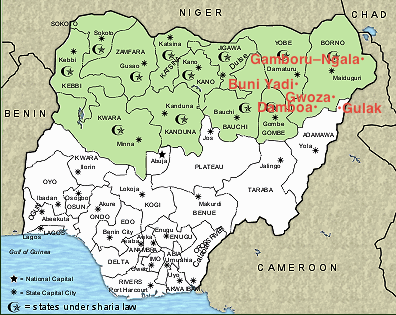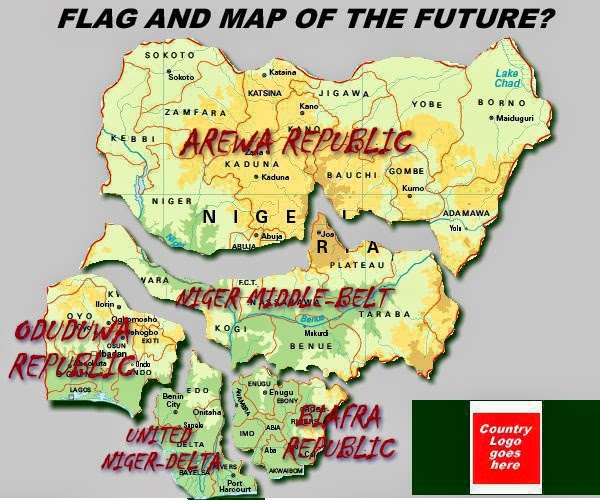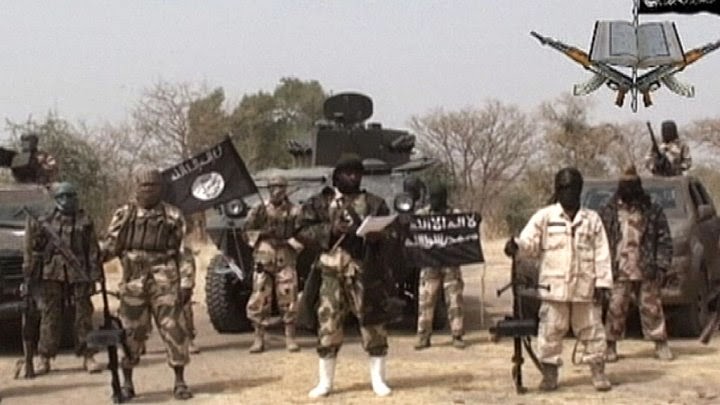Almost certainly inspired by the success of the Islamic State (I.S., also known as ISIS or ISIL) in capturing and holding a huge swathe of Iraq and Syria and declaring it the kernel of an eventual global caliphate, the Nigerian Islamist terrorist group Boko Haram has shifted from hit-and-run mass killings and is now concentrating on holding territory and declaring an Islamic state. This is a game-changer for Nigeria, Africa’s most populous and most combustively ethnically diverse country, and ushers in a new phase of what is clearly now a full-on sectarian civil war.
 |
| Boko Haram’s dune-buggy battalion |
 |
| Towns in Nigeria recently captured by Boko Haram are shown in red. An unknown portion of rural areas between them is controlled by Boko Haram as well. |
 |
| Abubakar Shekau |
 |
| Nigeria’s president, Goodluck Jonathan: helpless |
Setting up an Islamic state has been tried before. The Taliban called Afghanistan the Islamic Emirate of Afghanistan during the years it ruled there, a name still used in pockets of territory it controls. The Islamic Emirate of Somalia and the Islamic Emirate of Waziristan, in Pakistan, are names designating areas of those countries controlled by, respectively, al-Shabaab and various al-Qaeda and Taliban groups. An “Emirate of Waqar,” declared by al-Qaeda in a town in Yemen, was recaptured by the Yemeni government in 2012. The terrorist group Caucasus Emirate claims a state consisting of the Muslim areas in and near Russia’s North Caucasus mountains, but it does not administer any territory.
Closer to Nigeria, the al-Qaeda-linked groups Ansar al-Dine and MUJAO (Movement for Unity and Jihad in West Africa) controlled the northern two-thirds of Mali as an Islamic Republic of Azawad for about a year ending in early 2013 (see map above), when it was ousted by troops from France, Chad, and other countries. It still controls small territories, and, although it piggy-backed its agenda onto the back of a separatist uprising by the Tuareg minority, its avowed aim was to turn all of Mali into an Islamic state. Turning all of Nigeria into an Islamic emirate had been Boko Haram’s aim as well, and it had seemed absurd, since the country, which is about evenly divided between Christians and Muslims, is nearly entirely Christian in its southern half. But the new territorial claims are more pragmatic and are clearly inspired by I.S., which began by capturing towns in the west and north of Syria, expanded into Fallujah, Iraq, earlier this year, and has recently spread its territory northward up against the autonomous Kurdistan Region. I.S. never aimed to take all of Syria or Iraq; they are just taking as much as they can and running it like a state, and that seems to be Boko Haram’s plan as well.
Already a coalition and an international consensus is building to stop I.S. in its tracks, with even deadly enemies like the United States and Iran finding common cause on the issue. Syria and Iraq, of course, are a vitally strategic area, both geopolitically and economically. This is less true of the arid north of Nigeria. So who will stop Boko Haram?
 |
| Worst-case scenario? |
[For those who are wondering, yes, this blog is tied in with my forthcoming book, a sort of encyclopedic atlas to be published by Auslander and Fox under the title Let’s Split! A Complete Guide to Separatist Movements and Aspirant Nations, from Abkhazia to Zanzibar. (That is shorter than the previous working title.) The book, which contains dozens of maps and over 500 flags, will be on shelves and available on Amazon in February 2015. I will be keeping readers posted of further publication news. Meanwhile, please “like” the book (even though you haven’t read it yet) on Facebook and see this special announcement for more information on the book.]



